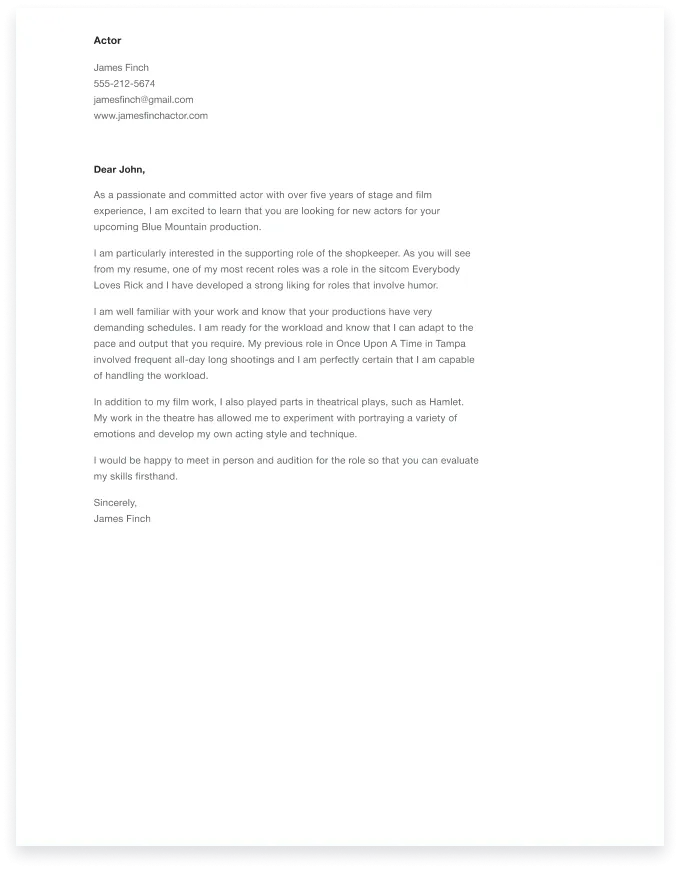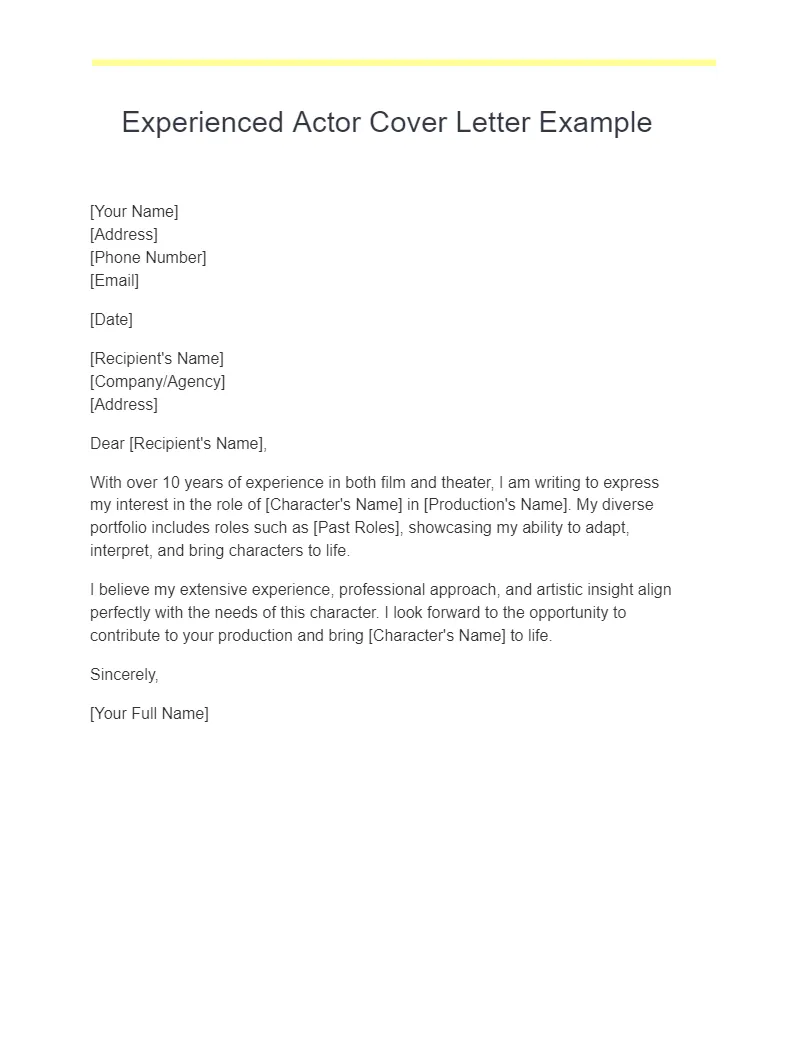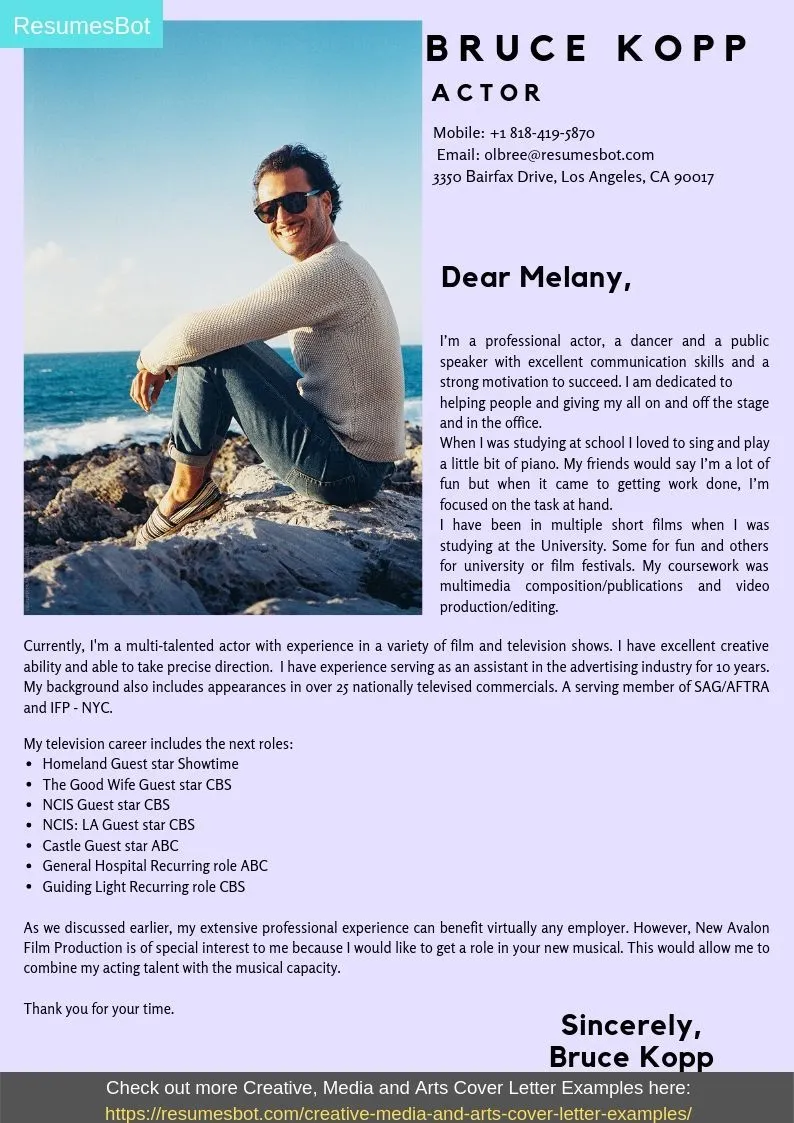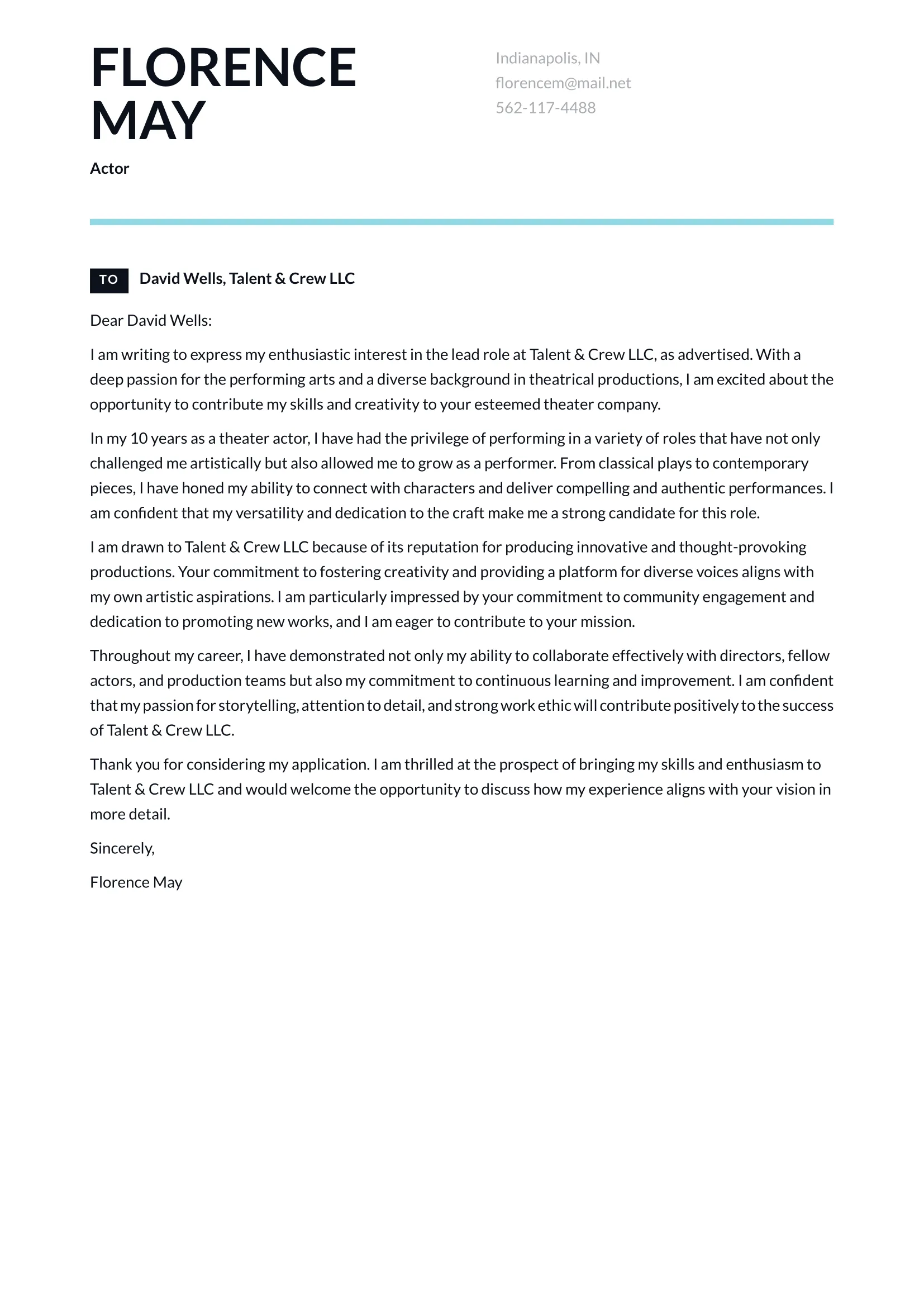What is an Acting Cover Letter
An acting cover letter is a crucial document that accompanies your headshot and resume when applying for acting roles. It serves as your first impression and provides a personalized introduction to casting directors, agents, and producers. Unlike a standard resume that lists your experience and skills, the cover letter allows you to showcase your personality, express your interest in a specific project, and highlight why you are the ideal candidate for the role. It’s your chance to make a compelling case and stand out from the competition. Think of it as your personalized elevator pitch, tailored to the specific opportunity at hand. A well-crafted cover letter can significantly increase your chances of getting an audition or securing representation. This is your first chance to make a lasting impression, and it needs to be impactful.
Why Cover Letters Are Important for Actors
Cover letters are not just formalities; they are essential tools for actors seeking roles. They offer a unique opportunity to communicate directly with those making casting decisions, beyond the limitations of a resume. A cover letter allows you to demonstrate your genuine enthusiasm for a specific project, which can be a significant advantage. It provides space to explain gaps in your resume, highlight relevant experience, and tailor your application to the specific requirements of the role. Furthermore, a well-written cover letter can help you showcase your writing skills, which is a valuable asset in the acting industry, as it demonstrates your ability to communicate clearly and professionally. Ultimately, a cover letter helps personalize your application and create a stronger connection with the casting team, increasing your chances of being noticed. Proper use of an acting cover letter can easily be the difference between landing the role and getting rejected.
Key Elements of an Effective Acting Cover Letter

Personal Introduction
Start with a strong, engaging introduction that immediately grabs the reader’s attention. Briefly state your name and the role you are applying for. If you were referred by someone, mention their name in the opening. The introduction should clearly state the purpose of your letter and express your enthusiasm for the project. Avoid generic opening lines; instead, personalize your introduction to make it stand out. A well-crafted introduction sets the tone for the entire letter and encourages the reader to continue.
Highlight Relevant Experience
Focus on the experience that is most relevant to the role you are applying for. Instead of listing every single credit, select the experiences that align with the character’s requirements or the project’s genre. Quantify your achievements whenever possible, using specific examples and data to demonstrate your impact. If you have experience in a specific skill relevant to the role, like stage combat or a particular accent, make sure to mention it. Tailor this section to show that you understand the role and the requirements of the project, making it clear why you are a good fit.
Showcase Your Skills

Go beyond listing your skills; showcase them through examples. Describe how you have utilized your skills in previous roles. If the role requires singing or dancing, briefly mention your experience and training. If you have any unique skills that might be relevant, such as playing a musical instrument or speaking multiple languages, be sure to include them. This section should not only list your skills, but also demonstrate their applicability to the role you are pursuing, providing concrete examples.
Mention the Project or Role
Demonstrate that you have done your research by mentioning specific details about the project or role that interest you. This shows your genuine interest and commitment. Explain why you are particularly drawn to the character or the story. If you have read the script or watched a trailer, reference specific elements that resonate with you. By showing that you understand the project and its requirements, you position yourself as a serious candidate.
Express Enthusiasm and Interest
Convey your excitement about the opportunity and your desire to be a part of the project. Let your passion shine through. Avoid generic statements like “I am interested in the role.” Instead, use more specific and engaging language. Explain what aspects of the role or project excite you the most. Demonstrate your eagerness to collaborate with the team and contribute to the project’s success. Your enthusiasm should be genuine and reflect your commitment to the acting profession.
Formatting and Presentation

Your cover letter should be easy to read and visually appealing. Use a professional font, such as Times New Roman or Arial, and maintain a consistent font size. Keep the letter concise, ideally no more than one page. Use clear and concise language, avoiding jargon or overly complex sentences. Proofread carefully for any typos or grammatical errors. Ensure your contact information, including your name, email address, and phone number, is prominently displayed. A well-formatted letter shows that you pay attention to detail and value professionalism.
Tailoring Your Cover Letter
Research the Project and Casting Director
Before writing your cover letter, thoroughly research the project and the casting director. Familiarize yourself with the project’s premise, genre, and target audience. If possible, watch any available trailers or read the script. Learn about the casting director’s previous work and their preferences. Addressing the casting director by name (if possible) shows you’ve taken the time to learn about them. This preparation will enable you to tailor your letter to the specific requirements of the role and the project.
Adapt to the Specific Role

Every role is unique, and your cover letter should reflect that. Customize your letter for each application, focusing on the specific requirements of the role. Highlight the skills and experiences that are most relevant to the character. Adjust the tone and language to match the project’s style. If the role requires a specific accent or skill, make sure to emphasize that you possess it or are in the process of learning it. Show how your unique qualities and abilities align with the role’s demands. Be specific; generic letters do not impress.
Proofread and Edit
Proofreading is paramount. Typos, grammatical errors, and formatting mistakes can immediately undermine your application. Before submitting your cover letter, meticulously proofread it. Read it aloud to catch any awkward phrasing or errors. If possible, have a friend or colleague review it for you. A polished cover letter demonstrates professionalism and attention to detail, which is essential for an actor. Take the time to ensure your letter is perfect; it is worth it.
Best Practices for Acting Cover Letters
Keep It Concise and Focused

Casting directors are busy, so keep your cover letter brief and to the point. Aim for one page, focusing on the most important information. Avoid unnecessary details and tangents. Clearly state your purpose, highlight your key qualifications, and express your enthusiasm. Respect the casting director’s time and make your letter easy to read. Brevity demonstrates that you respect the casting team’s time and value their attention.
Use Strong Action Verbs
Use strong action verbs to make your writing more dynamic and engaging. Instead of saying “I was in the play,” say “I performed in the play.” Use verbs that describe your accomplishments and skills, such as “created,” “developed,” “led,” “collaborated,” and “achieved.” Action verbs bring your experiences to life and showcase your abilities. They also create a more impactful and memorable impression on the reader.
Proofread Meticulously
Proofreading is crucial for eliminating any errors that can damage your application. Errors reflect poorly on your professionalism. Always proofread your cover letter several times, checking for typos, grammatical mistakes, and formatting inconsistencies. Read it aloud to help catch any awkward phrasing or errors. Ask a friend or colleague to review it for you, as a fresh pair of eyes can often spot mistakes you might miss. Make sure the letter is flawless before sending it.
Include Contact Information

Ensure that your contact information is easy to find. Include your full name, email address, phone number, and the name of your agent (if applicable). Place this information at the top of the letter or in the closing. Make sure the information is up-to-date and accurate. Double-check that your email address is professional. Providing clear contact information ensures that casting directors can easily reach you.
Common Mistakes to Avoid
Generic Cover Letters
Avoid using the same cover letter for every application. Casting directors can quickly identify generic letters and are less likely to consider them. Tailor your letter to each role and project. Research the project and the casting director. Show that you have a genuine interest in the specific opportunity and understand its requirements. Customize your letter to highlight the skills and experiences most relevant to the role.
Typos and Grammatical Errors
Typos and grammatical errors can instantly undermine your credibility. They indicate a lack of attention to detail and a lack of professionalism. Always proofread your cover letter carefully, checking for any mistakes. Use spell check and grammar check, but don’t rely on them entirely; read the letter aloud to catch any awkward phrasing. Ask a friend or colleague to review it for you. A flawless cover letter demonstrates that you take your acting career seriously.
Lack of Specificity
Avoid making vague statements about your skills and experience. Instead, provide specific examples and details. Instead of saying, “I am a good actor,” describe your specific accomplishments in previous roles. Instead of saying, “I am enthusiastic,” explain why you are excited about the project. Specificity shows that you understand the role and are genuinely interested in the opportunity. Provide concrete details to showcase your abilities and make your application more compelling.
Overly Formal Language
While professionalism is important, avoid using overly formal language that can sound stilted and impersonal. Your cover letter should be professional but also reflect your personality. Use a friendly and engaging tone. Write in a clear and concise style, avoiding jargon or overly complex sentences. Your goal is to create a connection with the casting director, and overly formal language can hinder that connection.
Conclusion
Writing a compelling acting cover letter is an essential skill for actors seeking roles. By following these guidelines, you can create a cover letter that effectively showcases your skills, experience, and enthusiasm, increasing your chances of getting an audition. Remember to tailor your letter to each role, proofread meticulously, and let your personality shine through. A well-crafted cover letter is an investment in your acting career; it’s the first step toward landing your dream role. Now go out there and make your cover letter shine!
